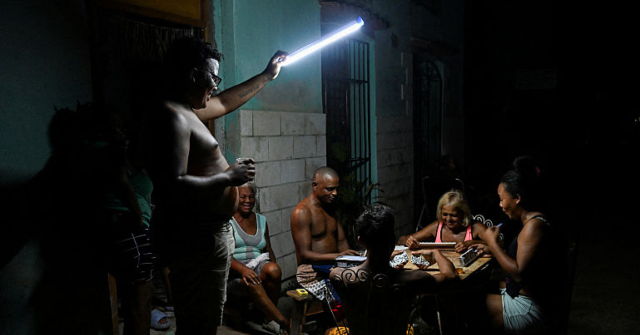Cuba’s barely functional power grid completely collapsed for the fifth time in less than a year on Wednesday, leaving the entire country without power throughout the day.
According to Granma, the official newspaper of the Communist Party of Cuba, the power grid has not been fully restored as of Thursday morning, as five provinces remain without power. In contrast, the Spanish news Agency EFE reported on Thursday that much more of Cuba is still without power.
The blackout started on Wednesday at 09:14 a.m. (local time) after the Antonio Guiteras thermal power plant in the province of Matanzas suddenly went offline. The independent outlet Cibercuba pointed out that the plant is the same one that caused prior mass blackouts in the country. Iván Hernández, general secretary of the Independent Trade Union Association of Cuba, further explained to Infobae that the thermal power plant is Cuba’s biggest.
“You can imagine the heat, food going bad, young children, the elderly, and bedridden people going through this… The discomfort is immense. People have nothing to eat and now even less to cook with, because most Cuban families prepare food using electrical appliances,” Hernández told Infobae.
Wednesday’s still unresolved nationwide blackout marks the fifth time in less than a year that Cuba’s derelict power grid has completely collapsed, and comes days after another massive power grid failure left Eastern Cuba without power over the weekend. Cuban figurehead “president” Miguel Díaz-Canel — who returned to the country this week following a tour of Vietnam, China, and Laos — said on a Thursday morning social media post that the power grid is generating “more than 1,000 MW” of power and that “most provinces are already connected.”
According to Granma, the Castro regime deployed a series of “microsystems” to provide power to crucial infrastructure such as hospitals and aqueducts as a temporary workaround to the non-functional power grid. Cibercuba reported on Thursday noon that one such system deployed in the Province of Granma collapsed twice. The ongoing nationwide blackout also forced hospitals to suspend surgeries and other medical procedures.
The independent outlet 14 y Medio reported that Cubans had to come up with “emergency solutions” to provide some form of comfort to children amid the blackout. One unidentified Cuban citizen explained that he had to “use my electric tricycle to charge the child’s fans.” Other citizens, the outlet detailed, have resorted to homemade wind turbines while one unidentified citizen said that wind turbines have become a “competitive” alternative to solar panels.
Cuba has a barely functional power grid after the communist Castro regime pushed it to the brink of complete ruin with decades of mismanagement and lack of due maintenance. As a result, the derelict power plants still working in the country are unable to generate enough electricity to power all of Cuba at once, forcing Cubans to endure daily blackouts.
The already years-long dramatic situation drastically worsened in October 2024, when the power grid experienced the first of so far five complete collapses that left Cuba without power for almost a week. Although the Castro regime managed to bring the power grid back online, it continued to function at an even more diminished capacity, leading to further collapses in the following months that continued throughout 2025.
The ruling communists, short of resolving the power crisis, have instead urged citizens to enact desperate “power saving” measures such as temporarily suspending all education and work activities in mid-February and requesting people bring their own power generators to banks and other state offices to provide them the requested services.
The subject of Cuba’s electricity collapse is one of the main issues on which the regime has sought increased assistance from China — which, throughout 2025, has become Cuba’s main benefactor, replacing Russia.
Although China has “donated” spare parts and supplies for Cuba’s power grid on several occasions over the past year, the Chinese assistance appears to have had little to no effect in restoring the nations’ power plants. In July, Díaz-Canel met with Chinese Prosecutor General Ying Yong and, in addition to revealing that Cuba’s notoriously repressive prosecutors received training from Chinese officials, thanked China for a broader “aid package” including unspecified amounts of solar photovoltaic packs and other photovoltaic systems for residential use. The systems, according to the Cuban presidency, would allegedly benefit “more than 10,000” Cuban families.
Christian K. Caruzo is a Venezuelan writer and documents life under socialism. You can follow him on Twitter here.
Read the full article here


